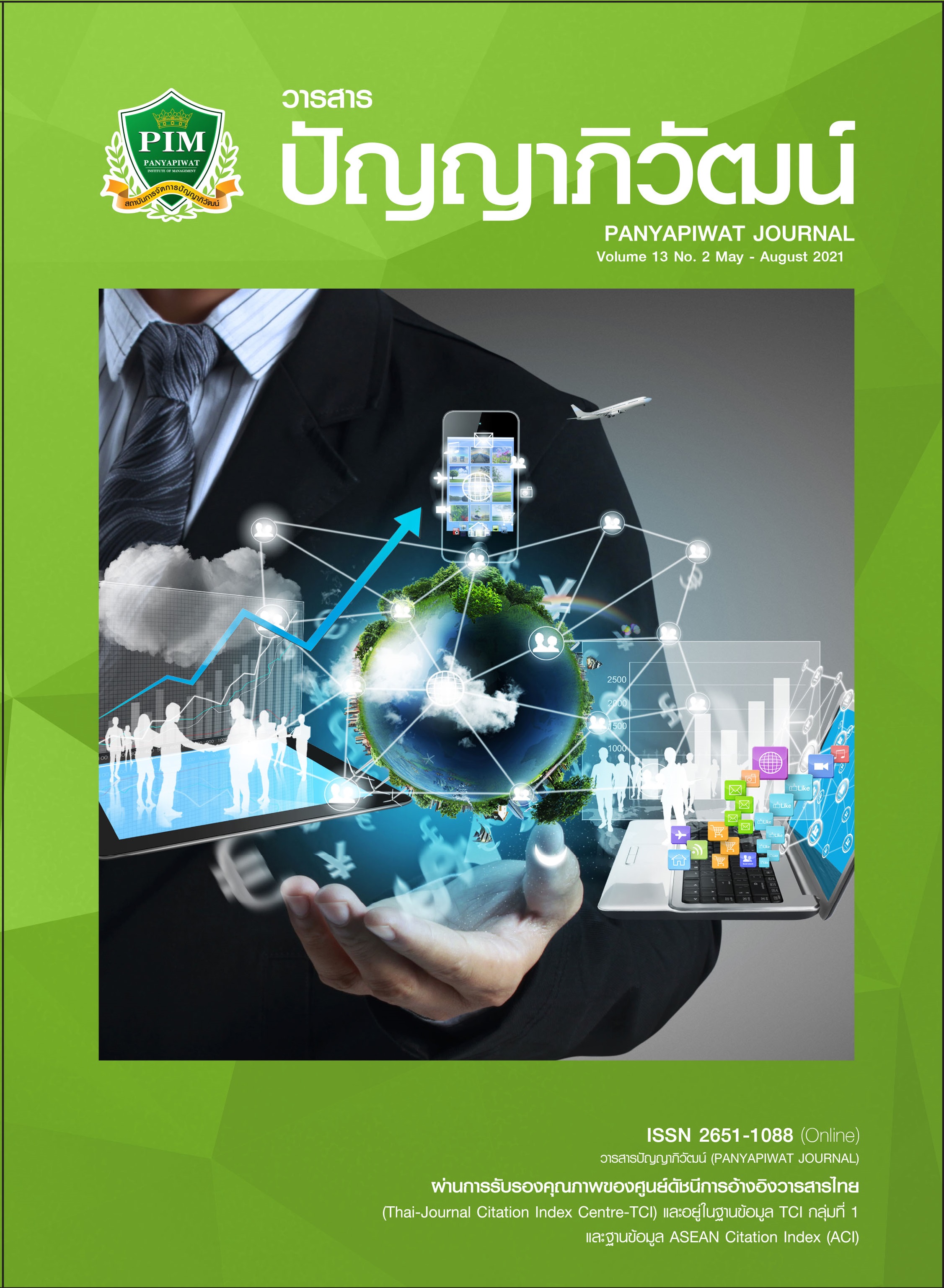การวิจัยเชิงปฏิบัติการเพื่อส่งเสริมนักศึกษาฝึกประสบการณ์วิชาชีพครูวิชาภาษาไทย ในการพัฒนาอภิปัญญาของนักเรียนที่เรียนวิชาภาษาไทย
Main Article Content
บทคัดย่อ
การวิจัยนี้มีวัตถุประสงค์เพื่อ 1) ศึกษาการใช้การวิจัยเชิงปฏิบัติการเพื่อส่งเสริมนักศึกษาฝึกประสบการณ์วิชาชีพครูภาษาไทยในการพัฒนาอภิปัญญาของนักเรียน 2) ประเมินอภิปัญญาของนักเรียนในวิชาภาษาไทย และ3) ศึกษาความสัมพันธ์ของอภิปัญญาและผลสัมฤทธิ์ทางการเรียนของนักเรียนในวิชาภาษาไทย กลุ่มเป้าหมายคือ นักศึกษาฝึกประสบการณ์วิชาชีพครูชั้นปีที่ 5 สาขาวิชาภาษาไทย คณะศึกษาศาสตร์ มหาวิทยาลัยเชียงใหม่ จำนวน 5 คน ในการพัฒนาอภิปัญญาของนักเรียนระดับชั้นมัธยมศึกษาที่เรียนวิชาภาษาไทย จำานวน 5 ห้อง ห้องเรียนละ 45 คน รวมทั้งสิ้น 225 คน จาก 5 โรงเรียนที่นักศึกษาไปฝึกประสบการณ์วิชาชีพครู ปีการศึกษา 2562 เครื่องมือที่ใช้เก็บรวบรวมข้อมูล ได้แก่ 1) แผนการจัดการอบรมปรับความรู้ให้แก่นักศึกษาฝึกประสบการณ์วิชาชีพครูและครูพี่เลี้ยง 2) แบบตรวจสอบคุณภาพของแผนการจัดการเรียนรู้โดยใช้กลวิธีอภิปัญญาของนักศึกษาฝึกประสบการณ์วิชาชีพครู 3) แบบนิเทศการสอนโดยใช้กลวิธีอภิปัญญาของนักศึกษาฝึกประสบการณ์วิชาชีพครู 4) แบบสะท้อนคิดของนักศึกษา ฝึกประสบการณ์วิชาชีพครู 5) แบบวัดและประเมินอภิปัญญาของนักเรียน 6) แบบสังเกตอภิปัญญาของนักเรียน 7) แบบวัดผลสัมฤทธิ์ทางการเรียนของนักเรียน 8) แบบสะท้อนคิดของนักเรียนที่เรียนโดยใช้กลวิธีอภิปัญญา และ 9) แบบสัมภาษณ์นักเรียน ผู้วิจัยได้ออกแบบและวางแผนวิจัยโดยใช้การวิจัยเชิงปฏิบัติการหรือ Action Research คือ การใช้วงจร PAOR หรือ Plan-ActObserve-Reflect การวิเคราะห์ข้อมูลเชิงปริมาณใช้สถิติเชิงบรรยายคือ ค่าเฉลี่ย ส่วนเบี่ยงเบนมาตรฐาน ค่าร้อยละ ค่าสหสัมพันธ์เพียร์สัน และค่าอิทธิพล (Effect Size) ส่วนการวิเคราะห์ข้อมูลเชิงคุณภาพโดยใช้วิธีการพรรณนาความ ผลการวิจัยสรุปได้ดังนี้
1. ผลใช้การวิจัยเชิงปฏิบัติการหรือ Action Research เพื่อส่งเสริมนักศึกษาฝึกประสบการณ์วิชาชีพครูวิชาภาษาไทยในการพัฒนาอภิปัญญาของนักเรียน ซึ่งแนวคิดเกี่ยวกับการวิจัยเชิงปฏิบัติการที่ใช้ในงานวิจัยตามที่ได้เสนอไปในข้อเสนอการวิจัยคือ การใช้วงจร PAOR หรือ Plan-Act-Observe-Reflect ในการพัฒนา นักศึกษาที่แบ่งออกเป็น 3 วงจรหลัก ได้แก่ วงจรที่ 1 การจัดอบรมสัมมนาเพื่อปรับพื้นความรู้ วงจรที่ 2 การสร้างและพัฒนาแผนการจัดการเรียนการสอน และวงจรที่ 3 การปฏิบัติการสอนจริง
2. ผลการประเมินอภิปัญญาของนักเรียนในวิชาภาษาไทย เมื่อพิจารณาจากคะแนนรวมพบว่า นักเรียนมีคะแนนอภิปัญญาโดยรวมเฉลี่ยหลังเรียนคือ 3.99 คิดเป็นร้อยละ 79.80 จากคะแนนทั้งหมด นักเรียนมีคะแนนเฉลี่ยของอภิปัญญาเพิ่มขึ้นจากก่อนเรียนและหลังเรียน ทั้งนี้ได้ค่า Effect Size (d) โดยภาพรวมเท่ากับ 0.31 ถือว่าคะแนนเพิ่มขึ้นในระดับปานกลาง
3. ค่าสัมประสิทธิ์สหสัมพันธ์ระหว่างอภิปัญญาและผลสัมฤทธิ์ทางการเรียนของนักเรียนทั้ง 5 โรงเรียนอยู่ในช่วง 0.25-0.68 (ตำ่ถึงปานกลาง)
Article Details

อนุญาตภายใต้เงื่อนไข Creative Commons Attribution-NonCommercial-NoDerivatives 4.0 International License.
“ข้าพเจ้าและผู้เขียนร่วม (ถ้ามี) ขอรับรองว่า บทความที่เสนอมานี้ยังไม่เคยได้รับการตีพิมพ์และไม่ได้อยู่ระหว่างกระบวนการพิจารณาลงตีพิมพ์ในวารสารหรือแหล่งเผยแพร่อื่นใด ข้าพเจ้าและผู้เขียนร่วมยอมรับหลักเกณฑ์การพิจารณาต้นฉบับ ทั้งยินยอมให้กองบรรณาธิการมีสิทธิ์พิจารณาและตรวจแก้ต้นฉบับได้ตามที่เห็นสมควร พร้อมนี้ขอมอบลิขสิทธิ์บทความที่ได้รับการตีพิมพ์ให้แก่สถาบันการจัดการปัญญาภิวัฒน์หากมีการฟ้องร้องเรื่องการละเมิดลิขสิทธิ์เกี่ยวกับภาพ กราฟ ข้อความส่วนใดส่วนหนึ่งและ/หรือข้อคิดเห็นที่ปรากฏในบทความข้าพเจ้าและผู้เขียนร่วมยินยอมรับผิดชอบแต่เพียงฝ่ายเดียว”
เอกสารอ้างอิง
Hartman, H. J. (2001). Teaching Metacognitively. In H. J. Hartman (Ed.), Metacognition in Learning and Instruction: Theory, Research and Practice. Boston: Kluwer Academic Publishers.
Jadkrathok, S., Na Nakorn, N., Chutinuntakul, S., Phonapichat, P., & Sittirit, P. (2016). The Development of a Scale to Measure and Assess Metacognition of Primary and Secondary School Students. Bangkok: National Institute of Educational Testing Service
(Public Organization).
Kajorn, A. (2017). The Development of Instructional Packages to Support Learning Management of Co–operative Learning on the Topic “Lilittalengpai”, of the Thai Language Department for Matayom Suksa 5 Students. Academic Journal of Mahamakut Budddhist University Roi Et Campus, 6(1), 1-11. [in Thai]
Kemmis, S. & McTaggart, R. (1988). The Action Reacher Planer. Victoria: Deakin University.
Schraw, G. & Dennison, R. S. (1994). Assessing Metacognitive Awareness. Contemporary Educational Psychology, 19, 460-475.
The Institute for the Promotion of Teaching Science and Technology. (2013). Assessment Results of PISA (Programmed for International Student Assessment) 2012: Mathematic Reading and Science Executive Summary. Bangkok: The Institute for the Promotion of Teaching Science and Technology (IPST). [in Thai]
Vaiyavutjamai, P., Charoenchaia, S., Ponmanee, S., Danpakdee, A., Chotivachira, B., Warotamawit, V., Kamol, N., Pankaew, P., & Sitthiwong, W. (2012). Collaborative Action Research to Promote Reflective Thinking Among Higher Education Students. Retrieved July 7, 2020, from https://www.sciencedirect.com/science/article/pii/S1877042812024639 [in Thai]
Wade-Jaimes, K., Demir, K., & Qureshi, A. (2018). Modeling Strategies Enhanced by Metacognitive Tools in High School Physics to Support Student Conceptual Trajectories and Understanding of Electricity. Science Education, 102, 711-743.
Wagaba, F., Treagust, D. F., Chandrasegaran, A. L., & Won, M. (2016). Using Metacognitive Strategies in Teaching to Facilitate Understanding of Light Concepts among Year 9 Students. Research in Science & Technological Education, 34(3), 253-272.
Wiratchai, N. (2005). Principles of Quantitative Research and Qualitative Research. Retrieved December 4, 2019, from https://www.research10ubru.con/work/nongluk.doc [in Thai]
Wongwanich, S. (2012). Classroom Action Research. Bangkok: Chulalongkorn University Press. [in Thai]


